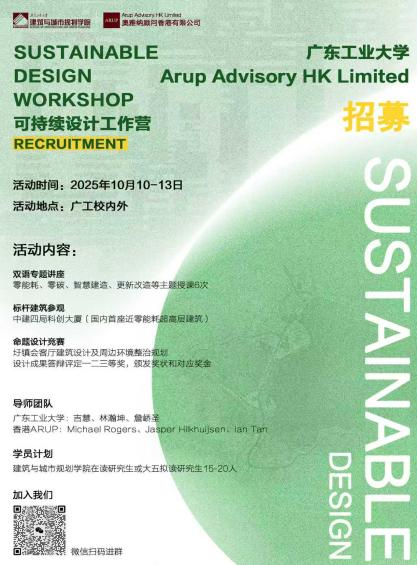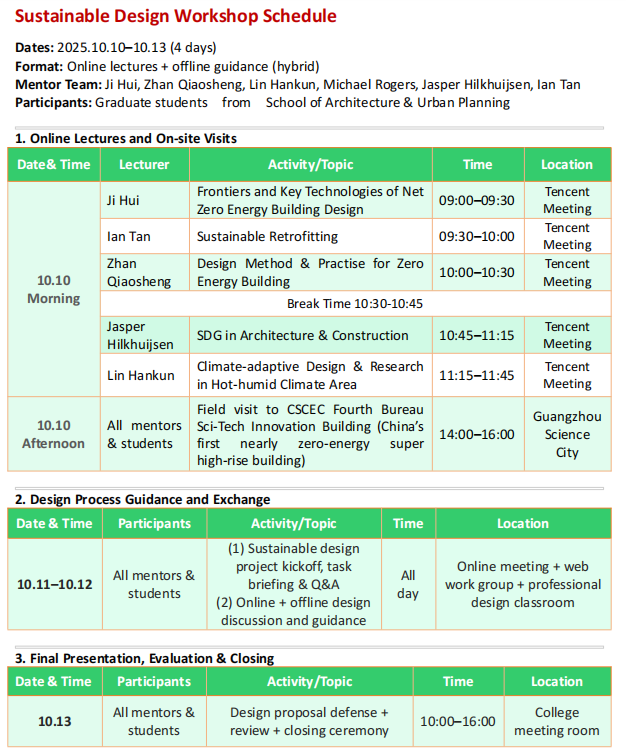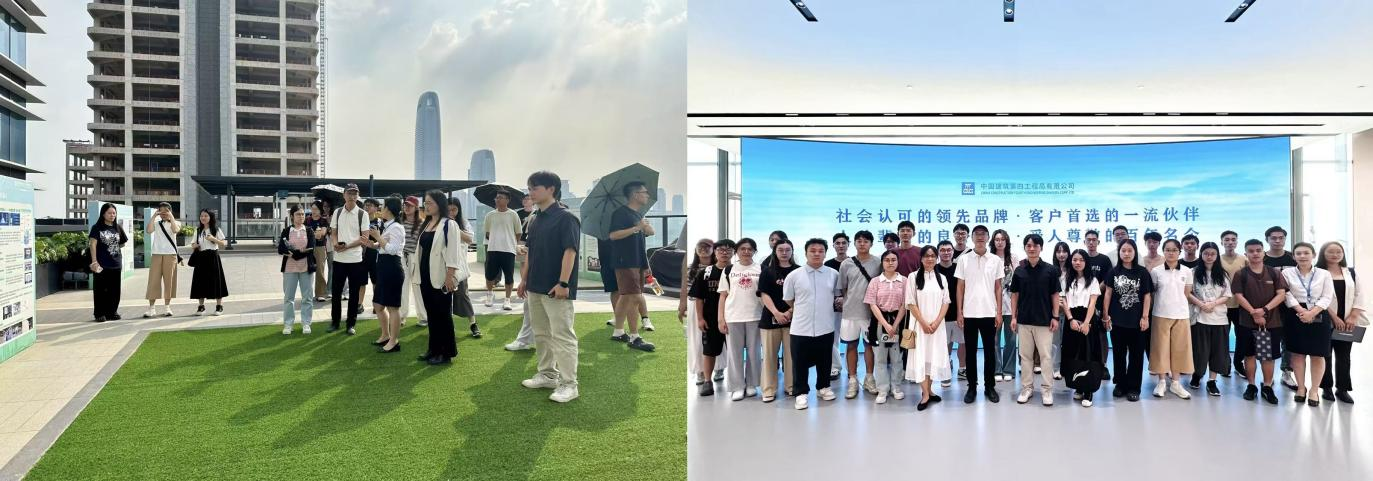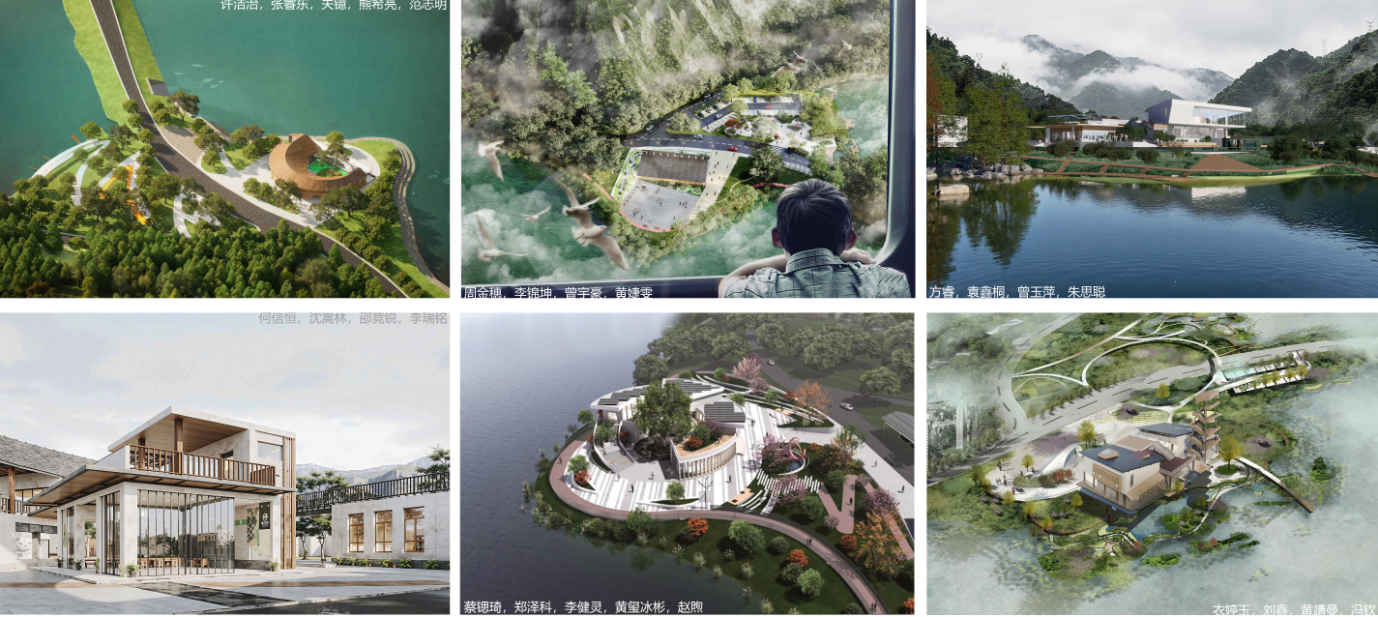The Sustainable Design Workshop, jointly organized by the School of Architecture and Urban Planning in Guangdong University of Technology (GDUT) and OVE ARUP & Partners Limited (abbreviated as Arup), was carried out successfully from 10 to 13 October 2025. Arup is an international consultancy shaping infrastructure, buildings, energy and sustainability for the built environment. As a leading example of excellence in the engineering field, Arup is committed to global sustainable development. This workshop, which involved research-based teaching activities in collaboration with a world-class engineering organization, has proved highly beneficial for the development of new engineering-practice courses. The open teaching philosophy and the university–enterprise joint model further fostered students’ international outlook, innovative thinking, and social responsibility. Centered on research-based design exploration into “Zero-Energy Building and Sustainable Development,” the workshop attracted over 30 postgraduate students from Architecture, Built Environment, Urban Planning, and Landscape Architecture disciplines upon the release of the recruitment poster (Fig. 1). Through theme lectures, field visits, and rapid architectural design competitions (Fig. 2), GDUT students were offered an immersive journey into sustainable site planning and building design.


Fig. 1. Recruitment Poster for Workshop Fig. 2. Schedule of Workshop
On-line Lecture: Focusing on Zero-Energy Building and Sustainable Development
The workshop commenced with an online lecture series in the morning of 10th October. Three Chinese mentors, namely Ji Hui, Zhan Qiaosheng, and Lin Hankun delivered theme lectures about green low-carbon design and sustainability method. (Fig. 3), while the two international mentors from Arup, Ian Tan and Jasper Hilkhuijsen spoke on the topics of sustainable retrofitting and Sustainable Development Goals (SDG) in Architecture and Construction. The lectures encompassed both cutting-edge theories on zero-energy buildings and expansive interpretations of sustainable development goals, alongside in-depth analyses of the international Solar Decathlon competition and practical experience from the climate-appropriate case in the Lingnan area. This provided students with a knowledge framework and technical system for sustainable design towards to China's long-term carbon neutrality goal. These lectures laid a rational foundation for the subsequent architectural design competition for a 500m² township reception hall.

Fig. 3. Series of themed lectures by panel of tutors
On-site Visit: Investigating a Nearly Zero-Energy Building
In the afternoon of 10th October, workshop participants visited the headquarter of China Construction Fourth Engineering Division located in Guangzhou Financial District, which is the first nearly-zero- energy super high-rise building in South China (Fig.4). Arup served as the MEP consultant for this project, integrating green concepts and advanced energy-saving measures throughout the building's entire life cycle. The project introduced numerous world-leading energy-saving and emission-reduction technologies, providing replicable solutions for achieving zero-energy target in high-rise office buildings. With professional guides explaning, the students gained a detailed understanding of the key technologies for its high energy efficiency, prefabricated construction, photovoltaic integration, and building energy management etc. The on-site visiting has provided students with a more profound understanding of the specialized knowledge covered in the morning's lectures, clarifying the strategies and technical pathways for achieving zero-energy goal in the township reception hall. All participants gathered for a group photograph in the exhibition hall on the top floor of the building after the tour, commemorating this valuable learning chance.

Fig. 4. Site Visit to the headquarter of China Construction Fourth Engineering Division

Fig.5. Design Proposals for the Township Reception Hall by Each Team
Sustainable Design Practice: mixed Collaborative Completion
The next two days October 11-12 , the workshop entered an intensive and rapid design phase. the participants working in teams to complete the design scheme of a 500m² township reception hall which is the practice and training centred on sustainable design principles and methods. The mentor panel delivered meticulous professional guide to each team through the teaching mode of online and offline in this period. The multifaceted teaching guidance model ensured every participant received continuous and specific design guide while embodying the pioneering spirit in exploring innovative teaching mode through university-industry collaboration. On the background of Dongyuan County's high quality development initiative and Wanglü Lake’s Scenic Area development which belong to the national 5A-level scenery, participants actively explored active-passive design strategies and technical approaches. The aim was to establish New Huilong Town’s reception hall as a rural benchmark embodying zero-energy demonstration and ecological sustainability and regional cultural identity. Demonstrating sharp intellect and strong collaborative skills, the participants excelled in both qualitative analysis and quantitative modelling. The research-oriented design schemes were remarkable and splendid just in 3days (Fig. 5).
Result Show: Presentation Review and Awards Ceremony
On 13th October, the workshop culminated in the final design defenses and comment session. Industry mentors Ian Tan and Michael Rogers from Arup's Hong Kong office participated as judges. Each team presented their final design outcomes, with the judges offering professional suggestions from sustainability, feasibility, and innovation perspectives. Following intense competition, the first, second, and third prizes were selected. Subsequently, professor Yun-Nan Cai who is the dean of the School of Architecture and Urban planning, associate professor Jianwen Huang who is the dean of the department of Architecture, and the industry mentors presented certificates to the winning teams. All attendees gathered for a group photograph in the meeting room, bringing thisremarkable experience to be a successful sustainable practitioner (Fig. 6).

Fig.6. Final Section of Design Scheme Presentation and Defence
The sustainable design workshop jointly organised by GDUT and Arup has not only established a bridge for industry-research collaboration between the university and renowned design institutions, but also provided postgraduate students with a valuable learning platform to engage with cutting-edge technologies and enhance their professional capabilities. Through 4 days of intensive study and practical application, postgraduates gained a deeper rational understanding of sustainable architectural design, creating unforgettable memories on their journey towards becoming outstanding engineers in the construction field.
